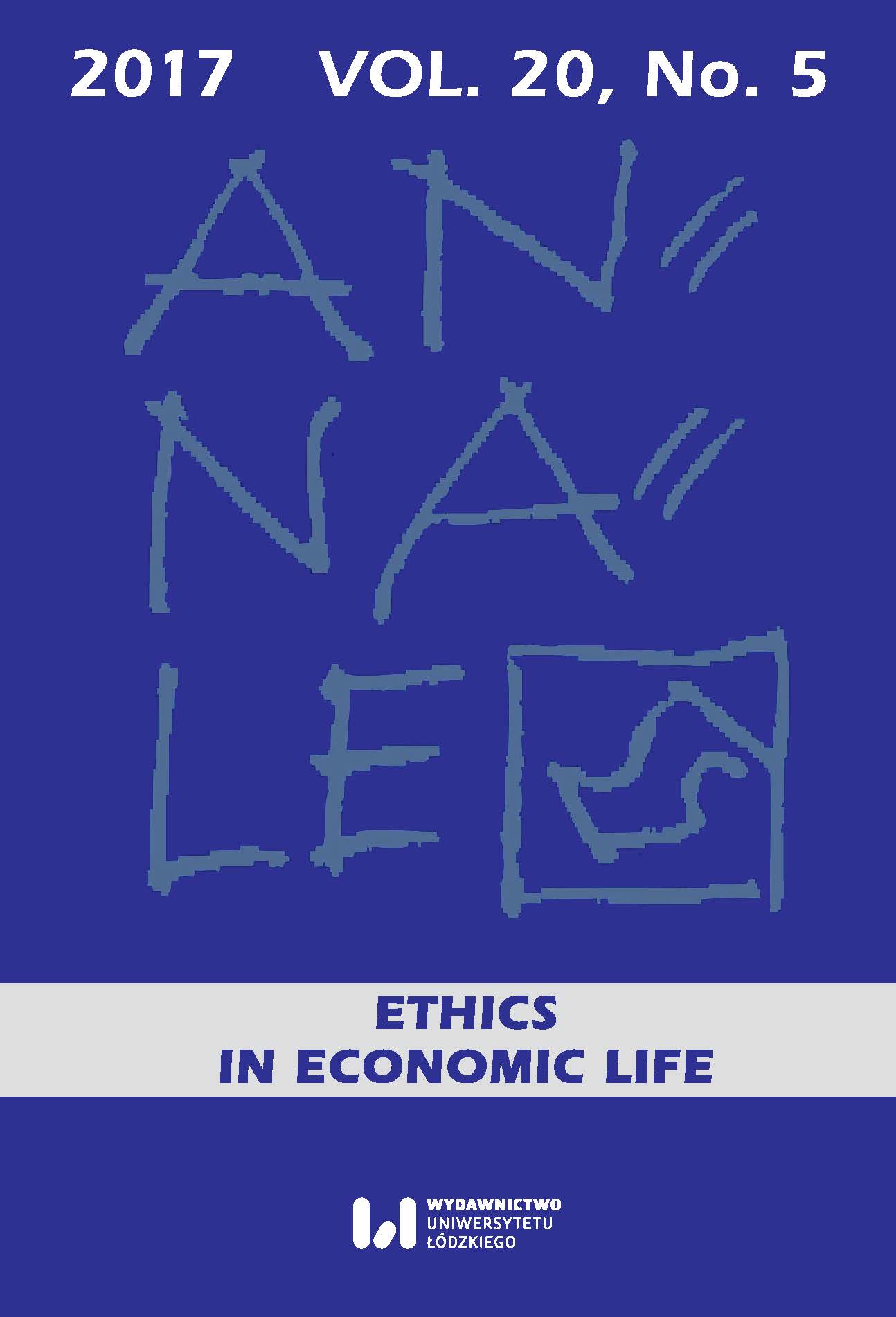Axiological entanglement of economics
DOI:
https://doi.org/10.18778/1899-2226.20.5.03Słowa kluczowe:
Wertfreiheit postulate, value, valuation, taste model, perception modelAbstrakt
In mainstream economics, the principle of freedom from value judgment (Wertfreiheit) is enforced. This principle has different interpretations. The aim of this paper is to present the author’s interpretations of the principle of Wertfreiheit. The basic ideas of axiology have been analysed: values, valuations, and value judgments, including their application to economic activities and economic researches. Two models of valuations have been presented—the taste model and perception model—as well as points of view of economic researches on those models. The conclusion comprises the author’s interpretation of the principle of Wertfreiheit as that of impartiality and integrity in research activities.
Bibliografia
Andreski, S. (1992). Maxa Webera olśnienia i pomyłki. Warsaw: Wydawnictwo Naukowe PWN.
Google Scholar
Aristotle. (1983). Metaphysics. Warsaw: Państwowe Wydawnictwo Naukowe.
Google Scholar
Augustine. (1977). The city of God. Warsaw: Pax.
Google Scholar
Descartes, R. (2001). Principles of philosophy. Kęty: Antyk.
Google Scholar
Friedman, M. (1953). The methodology of positive economics. In Essays in Positive Economics (pp. 3–34). University of Chicago Press.
Google Scholar
Griffin, J. (2000). Value judgement: improving our ethical beliefs. Warsaw: Fundacja Aletheia.
Google Scholar
Hobbes, T. (1954). Leviathan. Warsaw: Państwowe Wydawnictwo Naukowe.
Google Scholar
Hume, D. (1963). A treatise of human nature. Warsaw: Państwowe Wydawnictwo Naukowe.
Google Scholar
Hutchison, T. W. (1964). Types and sources of value-judgements and bias. In “Positive” economics and policy objectives. London: Allen & Unwin.
Google Scholar
Kant, I. (1986). Critique of judgment. Warsaw: Państwowe Wydawnictwo Naukowe.
Google Scholar
Keynes, J. N. (1955). The scope and method of political economy. New York: Augustus Kelley.
Google Scholar
Klimczak, B. (2014). Aksjologiczne uwikłanie ekonomii. Annales. Ethics in Economic Life, 17(1), 9–21
Google Scholar
Machlup, F. (1969). Positive and normative economics: An analysis of ideas. In Economic means and social ends. Englewood Cliffs: Prentice Hall.
Google Scholar
Mandeville, B. (1957). The fable of the bees. Warsaw: Państwowe Wydawnictwo Naukowe.
Google Scholar
Mill, J. S. (1936/1955). Essays on some unsettled questions of political economy. London: Kelley and MacMillan.
Google Scholar
Mill, J. S. (1962). A system of logic, ratiocinative and inductive (Cz. Znamierowski, Trans.). Warsaw: Państwowe Wydawnictwo Naukowe.
Google Scholar
Mill, J. S. (1965). Principles of political economy. Warsaw: Państwowe Wydawnictwo Naukowe.
Google Scholar
Myrdal, G. (1958). Value in social theory: A selection of essays on methodology. London: Routledge & K. Paul.
Google Scholar
Platon. (2010). Euthypro. In Symposium, Politicus, Sophist, Euthypro (pp. 321–345). Warsaw: Wydawnictwo Naukowe PWN.
Google Scholar
Popper, K. R. (1977). The logic of scientific discovery. Warsaw: Państwowe Wydawnictwo Naukowe.
Google Scholar
Popper, K. R. (1992). Objective knowledge. Warsaw: Wydawnictwo Naukowe PWN.
Google Scholar
Popper, K. R. (1999). The poverty of historicism. Warsaw: Wydawnictwo Naukowe PWN.
Google Scholar
Schumpeter, J. A. (2006). History of economic analysis. London: Routledge.
Google Scholar
Thomas Aquinas. (1967). Summa Theologica. London: Katolicki Ośrodek Wydawniczy Veritas.
Google Scholar
Weber, M. (1957). A sense of value-free sociology and economy. In Problems of a Sociology of Knowledge. Warsaw: Państwowe Wydawnictwo Naukowe.
Google Scholar
Pobrania
Opublikowane
Jak cytować
Numer
Dział
Licencja
Prawa autorskie (c) 2017 Annales. Etyka w Życiu Gospodarczym

Utwór dostępny jest na licencji Creative Commons Uznanie autorstwa – Użycie niekomercyjne – Bez utworów zależnych 4.0 Międzynarodowe.









